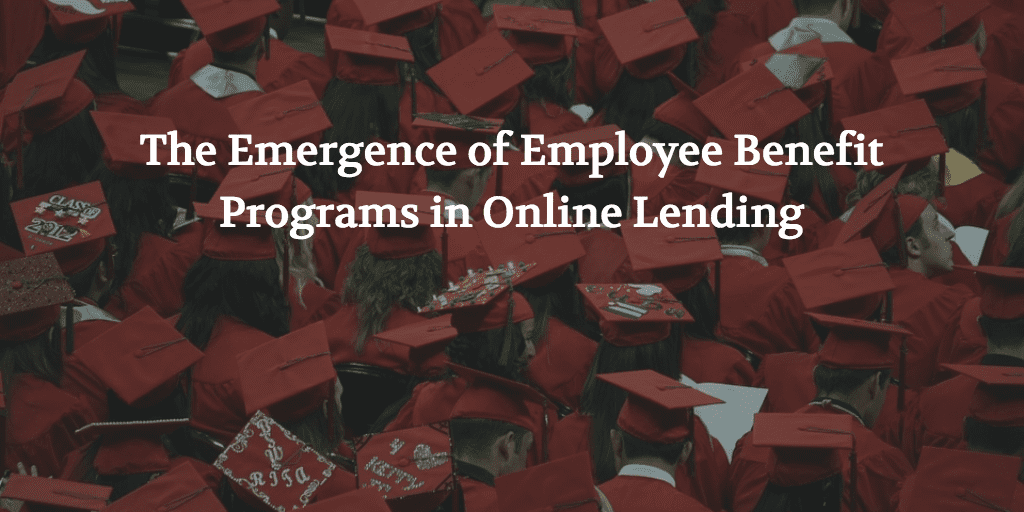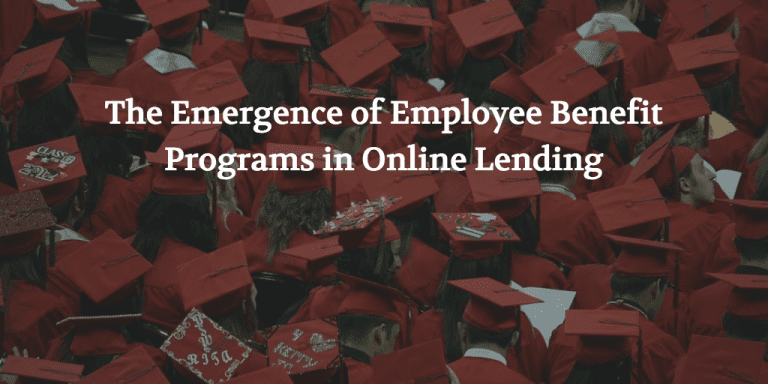
There is no question that student lending is a massive market and several companies in the online lending industry have been extremely successful at lowering the rates of borrowers through student loan refinancing. There are also companies like Credible who seek to educate borrowers on what student loan refinancing and private student loan options are available by presenting a variety of different loan options from different originators. Today, Credible announced that they are adding another originator to the mix with Sallie Mae, which will enable borrowers to take out loans through Credible’s platform. Bringing on the nation’s largest private student lender is a huge win for Credible.
But there is another opportunity for the originators themselves which is the employee benefits space and there are an increasing number of online lenders showing interest in the space.
The premise of combining student lending with employee benefits typically falls into the below categories of increasing involvement by the employer:
- Providing educational support to employees with student loans.
- Partnering with a platform to offer student loan refinancing.
- Partnering with a platform to offer student loan refinancing and offering a defined contribution to the employee’s loan.
As graduates enter the workforce with high levels of student debt, offering assistance to help pay off loans is very attractive from a prospective employee’s perspective. At this point, offering student loan assistance is a competitive advantage but it eventually could be the norm for larger employers.
We reached out to Stephen Dash, Founder and CEO of Credible to get his take on this new trend:
The growing popularity of employer student loan repayment benefits shows that employers recognize the burden student debt has on many young professionals, and that offering this benefit can give them an advantage in recruiting top prospects. When employers offer to help workers pay down their student loan debt, they can often get even more value from this benefit by refinancing their loans at a lower interest rate. Credible has partnered with Peanut Butter to empower companies to not only offer repayment assistance, but provide a platform for employees to get personalized rates on refinancing loans from multiple, vetted lenders who serve a broad range of borrowers — something they won’t see if they apply to a single lender.
Even Credible is playing a role in employee benefits. We learned yesterday that Peanut Butter, a startup which helps employers provide student debt services to their employees announced they were partnering with Credible.
But there are two bigger names who have recently announced their plans. Back in July, 2016 we featured student lender CommonBond’s total raise of over $300 million, but within that same announcement they shared that they had acquired a company called Gradible. Gradible is a personal finance platform which helps students manage their student debt and also enables employers to help with employees’ student loan repayment. So far CommonBond has had nearly 100 companies sign on to their employer partnership program.
It isn’t surprising that the other company pursuing this market is SoFi, who created the student loan refinancing industry and have since moved into mortgages, personal loans, life insurance, wealth management and now the employer benefits space. Their new program is called SoFi at Work and the goal is the same: to provide a service to employers to help their employees manage student debt. The two benefits currently offered are:
Student Loan Contribution Benefit: Administered by SoFi, companies make regular contributions directly to their employees’ existing federal or private student loans, reducing loan balances and saving interest expense.
Student Loan Refinancing Benefit: At no cost, companies make SoFi Student Loan Refinancing available to employees to help them save money and pay down their loans faster, with incentives like educational resources and a welcome bonus.
So far they have signed on over 600 companies across the United States. According to the press release 7 out of the 10 top tech firms in the Fortune 500 are participating. Mike Cagney, CEO, Chairman & Co-Founder at SoFi stated:
When it comes to employee benefits, we believe student loan help is the next 401(k). This is especially true for the Millennial generation, now the largest percentage of the workforce, who are starting their careers with record-setting student loan debt and deferring important priorities like retirement savings or buying their first home.
Conclusion
At the time we heard about the CommonBond news, a study by Willis Towers Watson found that 4% of companies offered a student loans assistance program for their employees, a number they estimate to increase to 26% 2018. This market was completely untapped before companies like SoFi and CommonBond entered and it is one that has enormous potential for growth. Although tackling student loans is the obvious choice, it has the potential to expand to personal loans or maybe other categories as well. From a lender’s perspective, adding the element of the employer into the mix brings a lot of unique opportunities such as the possibility of loan guarantees, subsidies offered by the employer and data around employment to name a few. It will certainly be interesting to see how the employer benefits space develops over the coming years and it is an area we will be keeping an eye on.


